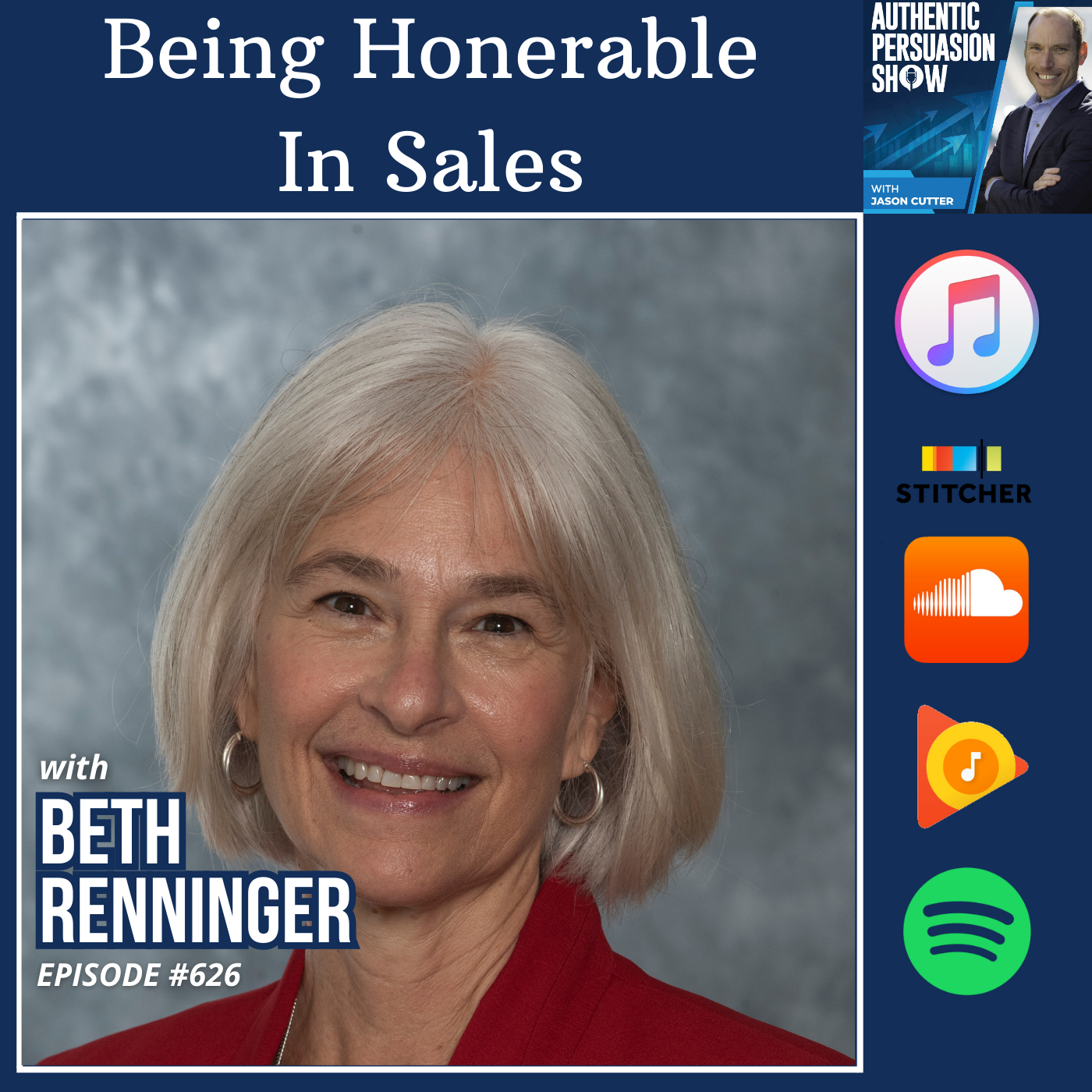Show Notes
What happens when trust is broken during the sales process? Obviously, it makes it tougher to close the sale. But what does it really look/sound like when it is done wrong? How can you avoid failing at the trust stage of your sales process? Where does trust even begin?
In this episode I continue the conversation about trust from episode 15.
Episode 16 – Transcript
Welcome to Episode 16 of The Sales Experience Podcast. My name is Jason Cutter and I started this podcast to help sales people and teams with closing more deals in the right ways that actually leave the customer in a better place as a result of working with you. I also want to help all of you regularly have that euphoric feeling that comes from helping other people buy from you. When done right, and you view sales as your service to other people, both parties will always feel good afterwards. Trust me.
Speaking of trust, that’s what this episode is about. The previous one was on trust building. This one is the yang to the trust ying. This is about losing, breaking or failing to build trust. No matter what you are selling trust is a huge component to closing the sale. At some point there will be a transfer of information, maybe even sensitive data, and of course money.
In the trust building steps, the first one I mentioned on the last episode was to always remember the rule that no one cares how much you know until they know how much you care. Cliché, yes. But 100% accurate. You can really screw up trust by not helping the other person know you care. Or even worse…you don’t actually care about your prospect as a person and the problems they are trying to solve. I have seen many sales reps who literally don’t care about the prospects they speak with, based on the type of things they say after the phone call or meeting.
How do you know if this might be you? First, if you aren’t asking any questions about them or their situation in relation to the problem your product or service solves. And I am not referring to getting to know them. That’s the rapport step we covered. Right now I am talking about trust – and the prospect’s mental defensive walls will stay up if they don’t feel like you care.
Second way the not-caring trust fail applies to you is if you instantly and consistently go into your monologue sales pitch. If you are doing this, examine if its working. Yes, when first speaking with a new prospect you will want to establish some credibility. But if you just start by throwing out your sales pitch then the prospect will assume you don’t really care about them as a person. This will then put you in the ‘sales rep’ bucket in their mind, instead of the person who is going to help improve their life in some way. They will assume you are just in it to sell them and make your commission. Of course, you are there to close deals and make money. But if that is only vibe they get from you – you will have a tough time converting people into customers.
When you make closing the deal about you and your needs and not the prospect and their needs then you will give off the salesy vibe that they will pick up. When you are desperate it becomes even worse. You can really damage trust by doing what every prospect is afraid of – that your goal is to get one over on them. They are worried about the lose-win sales experience. They are worried they will pay too much or buy something that doesn’t actually work. Yet, they are still there talking to you because the other part of them really wants or needs what you are selling.
You can destroy trust when you do what manipulative sales people would do. If you really need that deal then you will have what some people refer to as ‘commission breath’. Its that desperate energy that comes along with everything you say to that prospect as you push and push towards the close. It doesn’t work and its one of the most challenging things to switch off. When you really need that deal you cannot give off that vibe. You must stick with your sales process and do the first two steps – rapport and empathy – and keep moving forward with questions and customized solutions.
Lastly, have you ever noticed that when someone says ‘trust me’ you instantly get skeptical and actually trust them less? When I said that during the intro of this episode did you feel a twinge of your walls going up a little or a lot? Maybe you thought “who the hell is this guy to tell me I should trust him? He has only don’t like 18 episodes and I have never even heard him close deals!” If it helps, I felt bad even saying it. Trustworthy people don’t have to tell you to trust them. Maybe if you are about to skydive and the instructor you are strapped to knows you are scared and says ‘do you trust me?’ right before jumping out of the plane. That might one possible scenario where it works. But even then, if someone has to ask if you trust them then there is some doubt in either their or your mind.
Don’t ask your prospects to trust you. Show them you have earned their trust. Don’t be that salesperson who says things like “Don’t worry, you can trust me.” That is the international sign for making prospects feel like running the other way.
These are the main ways in my experience to not screw up the trust building step. Without trust you truly cannot move forward with the sale. And of course I do not know what you sell – your product or service might not require building a lot of trust. But I know it takes some trust for them to buy from you. If you are just selling a commodity where they don’t need to trust you, then you are just an order taker. And if you are listening to this I know your goal is not to be an order taker, but to be a sales professional. Your desire is to be successful with your goals by helping improve the lives of others through your service as a salesperson.
That’s it for this episode. If you are enjoying The Sales Experience Podcast, subscribe, rate and comment wherever you are listening to it. I love hearing from people who are in sales, especially if there is a way I can help you create more success for yourself. Send me an email at [email protected] or find me on LinkedIn. We can jump on a call and talk sales, and if I can help out in any way, I will. Trust me!
Until next time, always remember that everything in life is sales and people will remember the experience you gave them.
![[E16] Fundamentals Week: Trust Me](https://episodes.castos.com/salesexperiencepodcast/images/TSEP-Cover-Fundamentals-Week-2.png)


